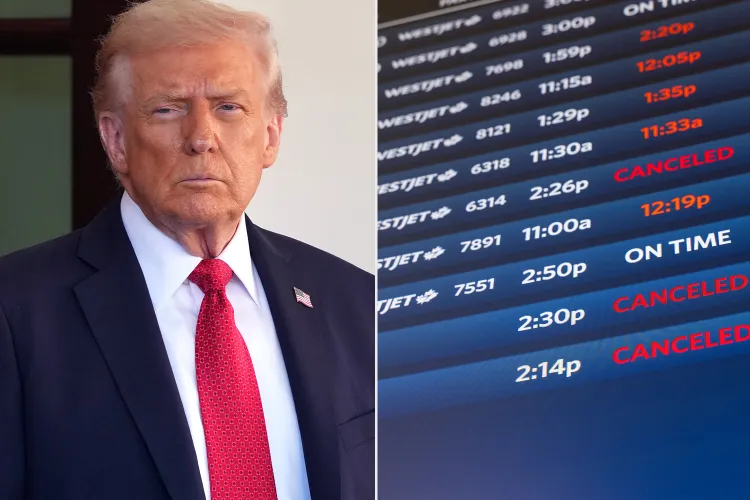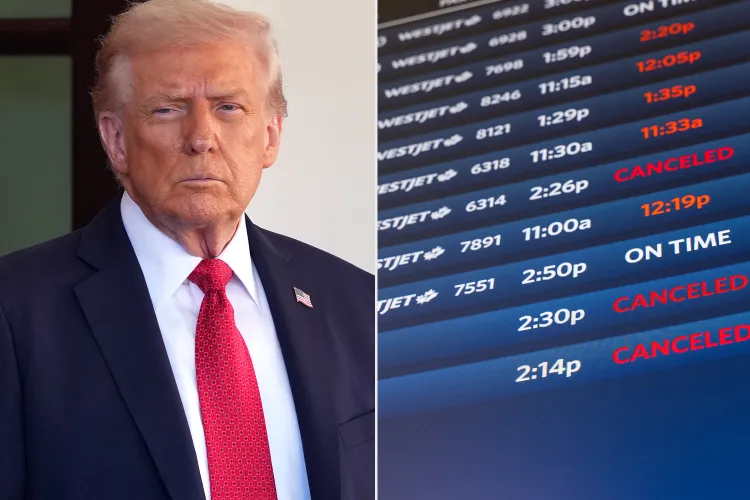Trump Slams Air Traffic Controllers Who “Did Nothing but Complain” During Shutdown — Offers $10,000 Bonus to Those Who Keep Working
As flight delays and cancellations continue to pile up at airports across the United States, former President Donald Trump has once again ignited controversy with a sharp message aimed directly at air traffic controllers. Amid an ongoing federal government shutdown that has forced many aviation employees to work without pay, Trump took to his social platform Truth Social to deliver a mix of threats and incentives — telling workers to “get back to work now” or face disciplinary action, while promising a $10,000 bonus to those who continue working through the crisis.

In a post shared early Monday morning, Trump wrote, “All Air Traffic Controllers must get back to work, NOW!!! Anyone who doesn’t will be substantially docked. Those who keep our skies safe deserve appreciation — and a $10,000 bonus will be given to all controllers who work without interruption during the shutdown.” The statement, which quickly spread across major news outlets and social media, reflects the tension growing between the Trump administration and essential federal workers as the shutdown enters its sixth week.
Trump’s remarks come as thousands of flights have been canceled or delayed nationwide due to staff shortages and fatigue within the Federal Aviation Administration (FAA). According to agency data, as many as 40% of controllers at the nation’s busiest airports — including Chicago O’Hare, Atlanta Hartsfield-Jackson, and Newark Liberty — have been unable to report for duty. Some cited financial strain from missing multiple paychecks; others described burnout from working excessive hours to fill the gaps.
For weeks, air travel has become a logistical nightmare. Passengers have faced hours-long waits at security checkpoints, reduced staffing in control towers, and a wave of cancellations disrupting holiday plans and business travel alike. Major carriers such as Delta, American, and Southwest have issued public apologies and waived change fees amid what the industry has described as “an unprecedented operational disruption.”
The FAA has already announced that it will reduce overall flight capacity by up to 10% across 40 major U.S. markets to maintain safety standards amid the shortage. Officials have warned that if the shutdown continues, partial airspace closures could become necessary — a measure unseen in modern aviation history. Transportation Secretary Sean Duffy addressed reporters late last week, saying, “We are reaching a point where staffing levels are incompatible with safe operations. If this continues another week, we could see mass flight delays or the closure of key regional airspaces.”
Trump, however, has blamed the situation not on the shutdown itself, but on what he called “lazy bureaucrats who think complaining is doing their job.” His remarks triggered immediate backlash from labor unions and lawmakers on both sides of the aisle. The National Air Traffic Controllers Association (NATCA), which represents over 14,000 controllers, condemned Trump’s comments, calling them “irresponsible and dangerous.”
“Air traffic controllers are among the most dedicated and highly trained professionals in the world,” NATCA said in a statement. “They are currently working under extraordinary stress, without pay, to protect the traveling public. The president’s comments demean their service and distract from the urgent need to reopen the government.”
Despite Trump’s promise of a $10,000 bonus, union officials pointed out that the incentive is unenforceable under federal pay law during a funding lapse — making it more of a political gesture than a binding commitment. Legal experts also questioned whether Trump’s “docking” threat carries any real authority without congressional approval or active federal funding.
The standoff mirrors a recurring pattern from Trump’s presidency and his return to political leadership — a strategy that blends public confrontation with transactional reward. Supporters argue it’s an effective motivator for efficiency, while critics see it as a divisive tactic that pits workers against one another in a moment of national stress.
A former FAA official, speaking anonymously, described the situation as “unsustainable.” “Controllers aren’t striking — they’re exhausted,” the official said. “They’re working double shifts, managing congested airways, and trying to do it while worrying about how to pay their bills. That’s not a political statement; that’s a safety hazard.”
Trump’s callout came after a weekend of particularly severe travel disruptions. On Sunday alone, more than 2,200 flights were canceled nationwide, with thousands more delayed. Weather contributed to some of the chaos, but staffing shortages remained the primary driver. At Dallas-Fort Worth, one of the nation’s largest hubs, only 60% of control positions were filled for overnight shifts. Pilots reported extended ground holds and route diversions as flight corridors were reorganized to match available coverage.
Industry analysts warn the economic consequences could be far-reaching. According to a report by Airlines for America, each day of reduced air traffic due to staffing shortages costs the U.S. economy roughly $250 million in lost productivity and passenger spending. The ripple effects extend to cargo operations as well, slowing the delivery of time-sensitive goods and medical supplies.
Meanwhile, Democrats in Congress have seized on Trump’s remarks as further evidence of what they call “chaotic leadership.” Senate Minority Leader Chuck Schumer criticized the president’s “attempt to bully essential workers who are doing their best under impossible conditions.” He added, “You don’t threaten the people keeping planes in the sky. You thank them — and you pay them.”
Even some Republicans have expressed unease with the president’s tone. Senator Susan Collins said in a statement, “We should not be attacking public servants who are working without pay. We should be finding a solution to reopen the government and ensure their salaries are restored.”
Still, Trump’s core supporters praised the message, interpreting it as an effort to restore accountability. On conservative media outlets, commentators applauded his bonus offer as a show of support for workers who “step up when others walk away.”
As public frustration grows, both sides appear entrenched. The White House insists that reopening the government will only occur if Congress approves Trump’s proposed spending package, which includes funding for border security and spending cuts to several federal agencies. Democrats, meanwhile, demand a clean funding bill to restore government operations before negotiations continue.
Caught in the middle are tens of thousands of federal employees — from air traffic controllers and TSA screeners to meteorologists and maintenance workers — all facing the same uncertainty. Many have resorted to taking temporary jobs or relying on food banks to make ends meet. Social media has been flooded with stories of federal workers selling personal belongings to cover rent or skipping medical appointments due to lapses in insurance coverage.
For travelers, the growing chaos feels reminiscent of earlier crises that tested the resilience of the aviation system, but experts warn this one carries a distinct danger: fatigue. “The longer this goes on, the higher the risk of human error,” said aviation safety analyst Mary Schiavo. “Air traffic control depends on focus. Distraction and stress are the enemies of safety.”
Whether Trump’s ultimatum and bonus promise will shift the situation remains uncertain. What is clear is that America’s air traffic system — one of the world’s most complex — is straining under the weight of politics. With every passing day of canceled flights and unpaid workers, the shutdown transforms from a budget standoff into a national crisis that tests the limits of patience, trust, and leadership.


